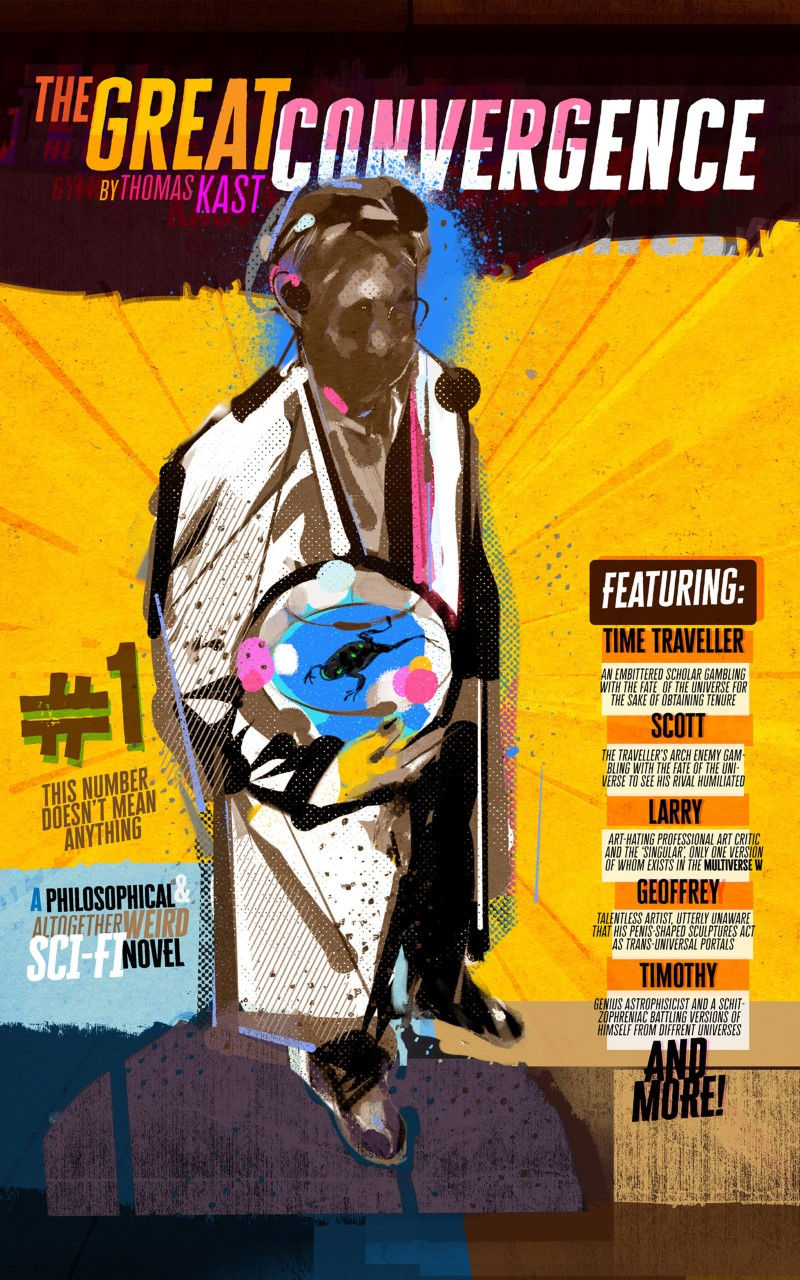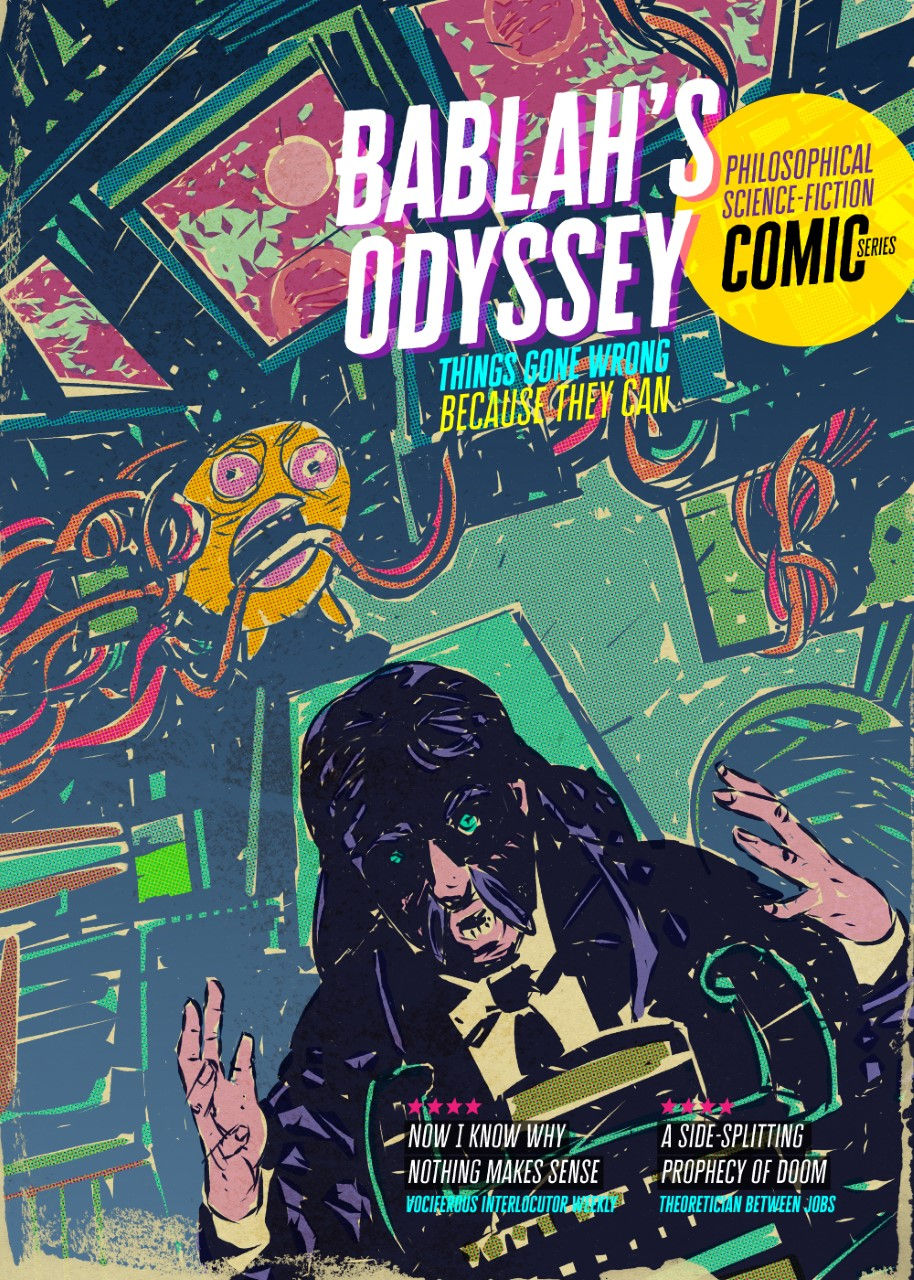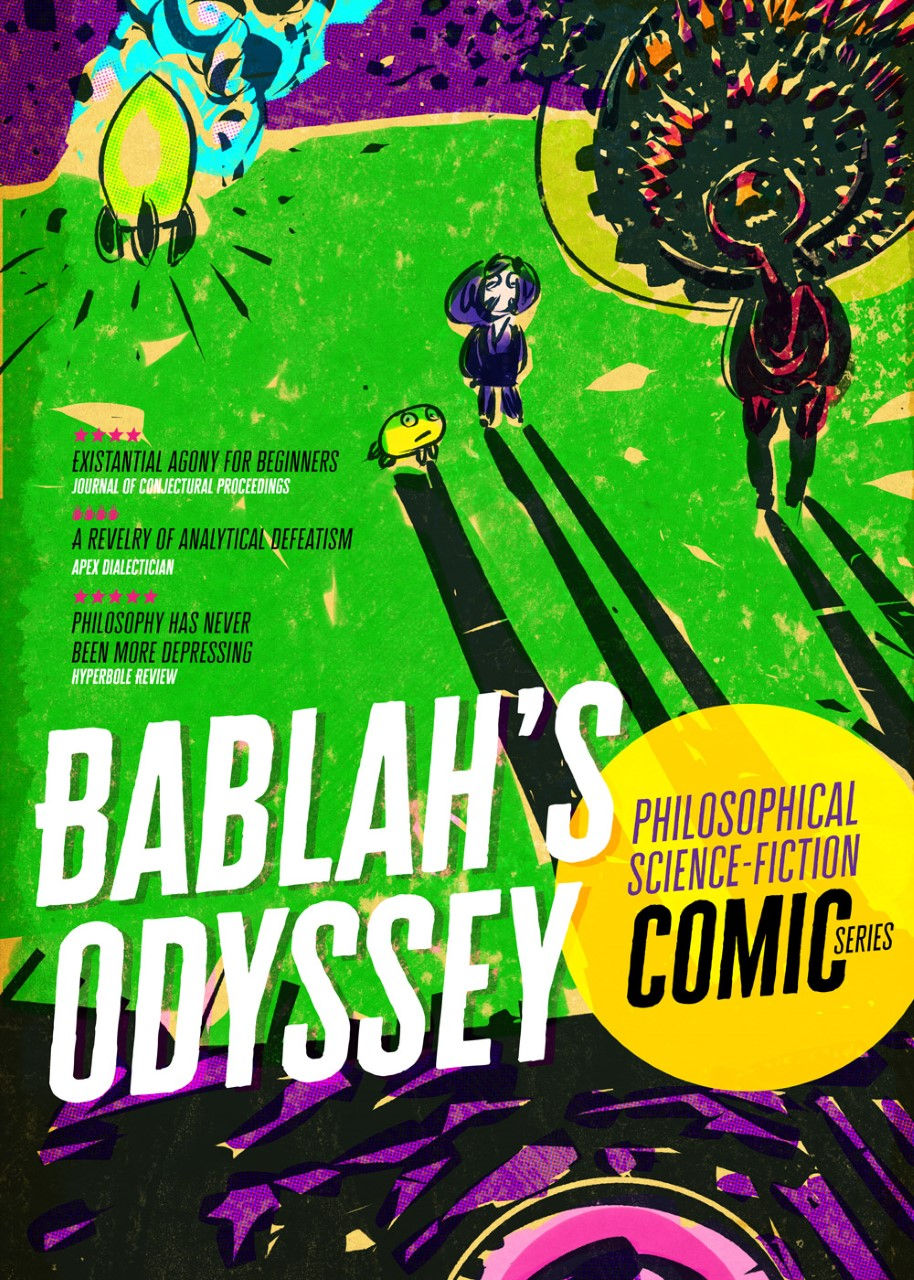Author Spotlight with Thomas Kast
- Madilynn Dale

- Jun 20, 2022
- 9 min read
1. Tell our readers briefly about yourself and not give just your bio. Write it as if you were on a talk show. How would you introduce yourself?
I’m an award-winning independent photojournalist and illustrator based in Zurich, Switzerland, and have published several photography art books. I’ve spent a big part of my life in Israel, where I taught photography and illustration at the Shenkar College of Engineering and Design and other Israeli colleges.
Dissatisfied with the state of contemporary literature, I decided to break every rule of writing. The fruit of my endeavours — the Great Convergence — weird as it gets, philosophical sci-fi has just hit the shelves. It broke them too.
2. What books do you have available?
The Great Convergence: an absurdist/philosophical science fiction novel.
Currently, I’m working on the humorous and philosophical comic book series Bablah’s Odyssey, which is scheduled for release in August 2022. Bablah’s Odyssey features a mad scientist, lord Bablah as he traverses the universe, mansplaining the ‘wonders of progress and civilisation’ to his unassertive yet perceptive mutant sidekick, the Pet-Thing.

3. Can you tell us about your most recent release?
The Great Convergence:
It’s the year 10.000.002 A.D. A cantankerous scholar slipping into obscurity is out for revenge. He time-travels to the year 2022 to stop his nemesis, Scott — a successful scientist at a competing university — from thwarting his research into the origin of a mysterious phenomenon, the Great Convergence. Cunning and ruthless, Scott will stop at nothing to defend his tenure track. The feud quickly spins out of control, and the damage to reality grows unchecked.
Caught in the crosshairs are three characters responsible for triggering the Great Convergence: an art-hating professional art critic who, unbeknownst to him, spontaneously switches between universes wreaking havoc as he goes; a talentless artist whose sculptures act as trans-universal portals; and a schizophrenic astrophysicist trying to avert the invasion of alternate versions of himself from different realities. As their paths converge, the apocalyptic event takes place, and the inescapable tragedy of human existence unfolds.
4. Do you stay in one genre when you write, or do you find yourself veering toward others?
I don’t write genre fiction. Even though the Great Convergence contains alternate realities, time travel and depictions of the world ten million years from now, it’s a simple story about a couple of characters lost in a world they neither fit into nor understand. There’s a lot of satire to be found in my book. But also philosophy, humour and social critique.
5. Are you a panster, planner, or someone in between?
I don’t have a writing routine, so every so often I can be incredibly chaotic and just go where my imagination leads me. At times, I spend a great deal of time straightening the timelines and making everything stick. I make plans and sketches for days or weeks, only to change everything at the last moment. When all is said and done, everything that transpires in my book is meticulously planned, and every seemingly insignificant event has its place and function.

6. What is your writing routine like?
I don’t have one. I take an interest in anything I possibly can. I jot down random notes without thinking about whether I’ll use them or not. Phrases, expressions, and sentences taken out of context. Anything and everything. Humans are particularly good at discerning patterns, so, sooner or later, a pattern does emerge. Once it does, I infuse it with my point of view. Characters appear and start interacting with one another. Soon enough, the action unfolds before my eyes, like a film. This is when I begin typing, trying to keep up with the events as they unfold.
7. Tell me about your favourite character that you’ve created?
The nameless narrator and his biased voice as he relates the story. He’s a failed researcher stuck at a dead-end university position. Unable to move on, he pigheadedly presses on investigating a once-fashionable subject no one is interested in anymore. Seeing the world through his eyes, the reader must discover the truth hidden by this thick veil of partiality. Frustrated as the narrator is, his observations are full of dry humour, and the constant feeling of being stuck in a place one doesn’t belong to is probably something many can relate to.
8. Where do you get your ideas for world-building?
Day-to-day observations. Everything and anything. Anytime. Even though there’s extensive world-building in my book, I only use the world as a backdrop to my characters or put their actions in context.
A part of my book features the world 10.000.000 from now. For all the technological advancements at humanity’s fingertips, the university of the future is run as a for-profit corporation, where science and progress are just side-effects of a cut-throat fight for personal advancement and prestige. This is a pity, because a lot is going on in the distant future. There’s a lab where the scientists grow universes to experiment on. There’s an old, baroque-like fountain spewing streams of time instead of water in the university’s courtyard. There is a site with portals connecting different universes, much like the Four Corners Monument in the US. It’s frequented by tourists taking selfies with a hand in one universe and a leg in another.
9. Do you add romance to your writing?
My characters do get involved in romantic relationships, but being deeply flawed individuals, their relationships are mostly dysfunctional and altogether grotesque. It’s a satire, after all, and so nothing works ‘as expected’ — romance including.

10. What was your favourite scene to create?
I think the one I’m especially proud of is one towards the end of the book. Timothy — the mentally challenged genius — can never tell whether the people he interacts with are real or not. The only ‘person’ he never doubts is a plush toy crocodile he carries on him and discusses his intentions with.
Timothy is trying to detonate an interdimensional portal used by the versions of himself from other realities to take over his universe, and who may or may not be the figment of imagination. When all Timothy’s plans fail, the crocodile comforts despondent Timothy, sitting dejectedly on the ground, saying: ’No matter what happens, at least we’ll always have each other.’
Depressing as it may sound at first, the question to ask is whether only the ‘real’ things can bring us comfort and solace. Maybe not?
11. Where do you get character inspiration?
I’ve been a university lecturer for many years, so I moulded my main character after myself, only I made him older, much grumpier and rather obnoxious — just for fun.
Geoffrey — an unsuccessful and talentless artist, is also a pitiful and close-minded version of me when I was an art student. The inspiration for creating Timothy, a schizophrenic astrophysicist, came during a photography project I’ve been doing at the institution for the mentally ill. The project took about two years to complete, during which time I spoke with the patients, the staff, psychologists and psychiatrists.
12. What genre do you prefer to read?
Science fiction, avant-garde, some classics, non-fiction — especially history and science, comic books but without superheroes.
13. Do you have any specific authors you follow and try to craft your work after?
I do my best not to sound like anyone else. Hence I don’t craft my work after any writer I read.
As for my reading habits, I like the wry humour of Kurt Vonnegut and Douglas Adams. I also like the philosophical insights of Stanislaw Lem and Philip Dick and the madness of William S. Burroughs. Some classics: Franz Kafka, Charles Bukowski, George Orwell, Jerome K. Jerome, Joseph Conrad and more. I like philosophy, but not the philosophers ;) I also read different mythologies and fairytales.
Apart from that, I read a lot of non-fiction: history (Ian Mortimer, Lucy Worsley, Stephen Runciman, Marc Morris, Juliet Barker, Christopher Hibbert, Barbara W. Tuchman), sociology and economics (Nassim Nicholas Taleb, William Davies, David Graeber) and popular science (Michio Kaku, Brian Greene, Richard Dawkins, Simon Singh, John Gribbin).

14. Do you have any recurring themes in your book?
Stupidity. It’s a subject that has always fascinated me. All of my characters make inexplicably unwise and shortsighted decisions despite being exceptionally smart (some of them). I think that narrow-mindedness and lack of imagination are vastly unexplored parts of human nature. We’re surrounded by wisdom and knowledge, yet humanity seems driven by the same parochial ignorance as if we were still living in caves. Superheroes are great, but it’s the stupid ones who provide all the fun. I’d love to see more empty-headed characters in literature and film.
Another recurring theme in my book is miscommunication. My characters are all stuck in situations they’re not comfortable with. Constantly missing the point, they don’t understand each other’s motives, and they’re unable put themselves in someone else’s shoes. They oscillate between being inordinately overconfident or hopelessly insecure but can never think on two feet. Above and beyond, they’re blindsided by their personal goals they consider important, and which are really insignificant and trivial. As irony would have it, they all have a profoundly important part to play on the universe’s stage. Sadly, they’ll never know it.
15. What does your editing process look like?
I use Aeon Timeline to maintain order in my characters’ interconnecting timelines. This is also where I construct the plot and place major events. I write in Ulysses, a very nice app for writers — it helps me organise everything without too much sweat. Each chapter is divided into scenes, I easily can re-shuffle as needed. I eliminate lengthy phrases and words and make sure only the essential sentences remain.
I use Grammarly to catch up on silly mistakes, then go over the text myself before sending it off to editors. No paper, all done on computer / iPad. I used to write myriads of notes in the past, but this quickly got messy.
16. Do you have a preferred drink or snack that you eat/drink while writing?
I drink a lot of Xenophrite — it’s a radioactive element in a liquid form that doesn’t exist in our universe. My mutated octopus butler procures it each morning. He doesn’t tell me how he gets it, and I don’t ask.
17. When is your favourite time of day to write, and why?
For me, writing (as in — typing) is a but a conclusion of a long and complex process I call ‘writing’. I ‘write’ all the time. I make up stuff in my head and forget most of it. Sometimes I’m lucky to jot it down. Sometimes not. I talk to people. Sometimes I listen, but mostly I do the talking. Sometimes I think. More often than not, I just act thoughtlessly. Then reflect on it. Or not. All of this is what I call writing.
As for my favourite time for writing, it’s when I’ve accumulated enough thoughts in my head, and I can’t hold it any longer. This is why I don’t understand ‘writer’s block’. What’s the point of forcing yourself to write if you’ve nothing to say? Wait until you do.

18. What is your favourite vacation spot?
I live in Switzerland, and despite travelling a lot — the alps remain my favourite vacation spot. No place like it — as far as I’m concerned.
19. Marvel or DC? Do you have a favourite character?
I’m not much into the superheroes genre, I’m afraid. I’m more interested in people, rather than archetypes. I treat science fiction as a vehicle to explore humanity — our behaviour, dreams and desires. To ask questions about the meaning of life and to answer them. Subjectively, to be sure :)
Just not to sound dour — I do enjoy Marvel’s humour and DC’s grittiness. Guardians of the Galaxy is by far my favourite Marvel film. Probably the best space opera there is. DC’s Watchmen had great depth, so I liked it very much. Same with Joker — that was an outstanding film.
20. What hobbies do you have?
Palaeontology — the study of dinosaurs and other prehistoric creatures. Psychology and economics. Architecture and urban design.
I also like to bend what’s straight, knock the billiard balls and go left when everyone goes right.
21. What is something your readers don’t know about you or something unique about yourself?
I’ve been diagnosed with Autism spectrum disorder (Asperger’s syndrome as it used to be known). This means that I’m uniquely predisposed to see things that others can’t. At the same time, I’m hopelessly blindsided, and the intricacies of social interaction remain a total mystery to me. Because of my condition, I’ve been an outsider most of my life (which I don’t regret), and so are my characters.
22. What defines success for you as an author?
To be proud of and happy with your work. No more, no less.
23. What is your workspace like?
Mostly clean and organised. This stands in stark contrast to my writing process :)
24. Do you have a self-care routine that you follow?
I jog and swim frequently. I also do gymnastics and stare blankly into infinity every time I need to clear my mind.
25. What advice would you share with new or aspiring authors?
I know that everyone seems to write these days, and it may feel that there’s something wrong with you if you don’t. Writing is a specific form of expression, and it’s not for everyone. You’ll know if you constantly gravitate towards it. If you don’t — then you shouldn’t force yourself. Express yourself differently. Or don’t — it’s also fine. Not everyone has to be an artist. Really.

26. Where can our readers find you?
Amazon: https://www.amazon.com/Great-Convergence-altogether-existential-philosophy-ebook/dp/B099Z5KH33
Personal website: https://thomaskast.com
Writings: https://thomaskast.space
Comic Books: https://thomaskast.space/bablahs-odyssey



Comments